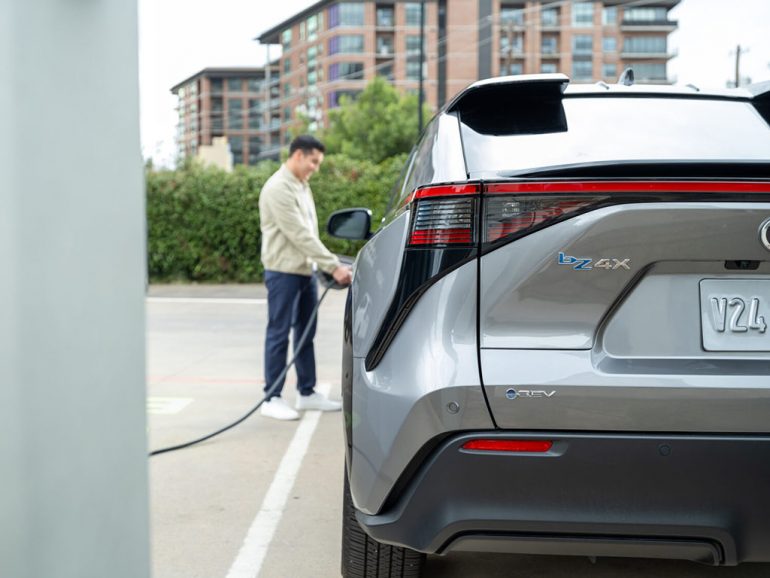Toyota Delays U.S. EV Manufacturing to 2026 Amid Shifting Market Dynamics : Automotive Addicts
Automotive

Because the automotive world accelerates towards electrification, Toyota’s current determination to delay its U.S. electrical car (EV) manufacturing to 2026 has raised questions on the way forward for its EV technique. Initially slated to start manufacturing in late 2025 at its Kentucky plant, Toyota has now postponed this timeline, citing design changes and slowing EV gross sales. This transfer, first reported by Nikkei and confirmed by Toyota spokesperson Scott Vazin, displays broader business challenges and alerts potential shifts in Toyota’s method to the electrical car market.
What’s Behind The Delay?
Toyota’s preliminary plan was to launch the manufacturing of a three-row battery-electric SUV in Kentucky by the tip of 2025. Nevertheless, the timeline has now slipped into early 2026. In keeping with Vazin, the delay isn’t fully surprising, as Toyota had beforehand acknowledged the potential for manufacturing creeping into 2026.
One of many key causes for this postponement is the necessity for design changes. Nevertheless, a extra vital issue at play appears to be the cooling demand for EVs in North America. Whereas early adopters have embraced EVs enthusiastically, broader market penetration has been slower than anticipated. That is partly as a result of excessive car costs, inadequate charging infrastructure, and shopper considerations about vary anxiousness—components that proceed to problem the mass adoption of electrical automobiles.
Is The Shifting Technique A Response to Market Circumstances?
Toyota’s delay isn’t just a response to operational challenges; it’s additionally reflective of broader shifts within the EV market. Along with suspending U.S. manufacturing, Toyota has reportedly scrapped its plan to supply electrical SUVs beneath its Lexus model in North America by 2030. As an alternative, the corporate will import absolutely assembled EVs from Japan, a transfer that means Toyota is reevaluating its U.S. EV manufacturing technique.
Apparently, whereas Toyota has been comparatively sluggish to totally decide to EVs in comparison with rivals like Tesla and GM, the automaker plans to introduce 5 to seven battery-electric fashions within the U.S. inside the subsequent two years. This alerts that regardless of the delay, Toyota will not be abandoning its EV ambitions however is as a substitute taking a extra measured method.
Toyota’s determination to push again manufacturing isn’t taking place in isolation. The automaker has confronted provide chain disruptions and governance points which have contributed to this delay. The worldwide automotive provide chain remains to be grappling with the aftermath of the COVID-19 pandemic, chip shortages, and different disruptions which have slowed car manufacturing throughout the business. In actual fact, Toyota needed to make investments a whopping $1.3 billion in its Kentucky facility in February to bolster its electrification efforts.
This funding underscores Toyota’s dedication to electrification, nevertheless it additionally highlights the numerous monetary and logistical hurdles automakers face in transitioning to EV manufacturing. From uncooked materials shortages to battery provide constraints, constructing EVs at scale is proving extra advanced than many automakers initially anticipated.
What This Means for the U.S. Market
So, what does Toyota’s delay imply for the U.S. EV market? Whereas it could look like a setback, it’s essential to view this within the context of the bigger automotive business. The EV market remains to be in its infancy, and rising pains are anticipated. Toyota’s cautious method might properly repay in the long term, as the corporate continues to prioritize reliability and design innovation.
By delaying manufacturing, Toyota can make sure that its first U.S.-made EV meets the corporate’s excessive requirements and aligns with evolving shopper preferences. Moreover, by importing automobiles from Japan, Toyota can proceed to serve the U.S. market with out overcommitting to home manufacturing earlier than the market is able to help it at scale.
Toyota’s determination to delay its U.S. EV manufacturing is a calculated transfer that displays each inside challenges and exterior market realities. Whereas some might view this as a missed alternative to capitalize on the rising EV market, it may be seen as a strategic pause—permitting Toyota to refine its product lineup, handle provide chain points, and reply to market demand extra successfully.
As the corporate introduces new battery-electric fashions over the following few years, the true query shall be whether or not Toyota’s cautious method will permit it to achieve a aggressive edge in an more and more crowded EV market. For now, the delay alerts that the race towards electrification could also be extra of a marathon than a dash—and Toyota is pacing itself for the lengthy haul.
Supply: Reuters
FOLLOW US TODAY:






